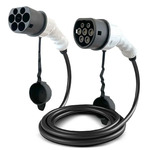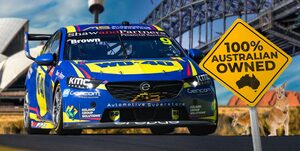Click & Collect
2H Hudson Ave Castle Hill NSW 2154
TYPE 2 TO TYPE 2 (ype 1 J1772 to Type 2 also available at this price)
Can be used in any public point as well as at home. To easily find out which cable your car needs you can check your car charging port. If the port has 7 pins it is a Type 2 car and needs a Type 2 to Type 2 cable. If the port has 5 pins it is a Type 1 car and needs a Type 1 to Type 2 cable.
32 AMP FOR FAST CHARGING
Charge your EV or PHEV on all Type 2 home or public charging points at 16(3.6kW) or 32(7.2kW) amps. This single phase cable also works with 16 amp cars by down-rating automatically, making this 32 amp version future proof. An average charge time of 4:37 hours or 25 miles of range per hour of charge (20-80% 50kWh battery). Perfect for home use as it’s optimised for the maximum power output of home charge points. This helps to reduce charging times and take advantage of reduced energy costs.
RCD PROTECTION
A RCD (residual-current device) is designed to protect against the risks of electrocution and fire caused by earth faults. It is an additional safety feature, designed to offer even better protection for you and your vehicle.
5 METRE CABLE LENGTH
Featuring a 5m long length cable, ensuring easy charging in every situation and in every surrounding.
IEC, TUV CERTIFIED AND UKCA/CE COMPLIANT
Be confident knowing that this electric charging cable is IEC and TUV certified whilst also being UKCA/CE compliant, which ensures the user’s safety.
IP55 RATED AND TESTED TO 2500V DC
Meaning the product is durable and waterproof, making it a perfect choice for outdoor charging.
LIGHTWEIGHT AND ULTRA FLEXIBLE
Designed with practicality and durability in mind. This electric charging cable is made out of flexible and lightweight rubber to make it easy to store and transport. The handles are made from hard wearing PBT.
Features
32 AMP FOR FAST CHARGING
TYPE 2 TO TYPE 2
RCD PROTECTION
5 METRE CABLE LENGTH
IEC, TUV CERTIFIED AND UKCA/CE COMPLIANT
IP55 RATED AND TESTED TO 2500V DC
LIGHTWEIGHT AND ULTRA FLEXIBLE





Should opt for a 3-phase 22kW type 2 charging cable, to eliminate slow charging speed if you plug this single-phase cable into a 3-phase AC outlet.